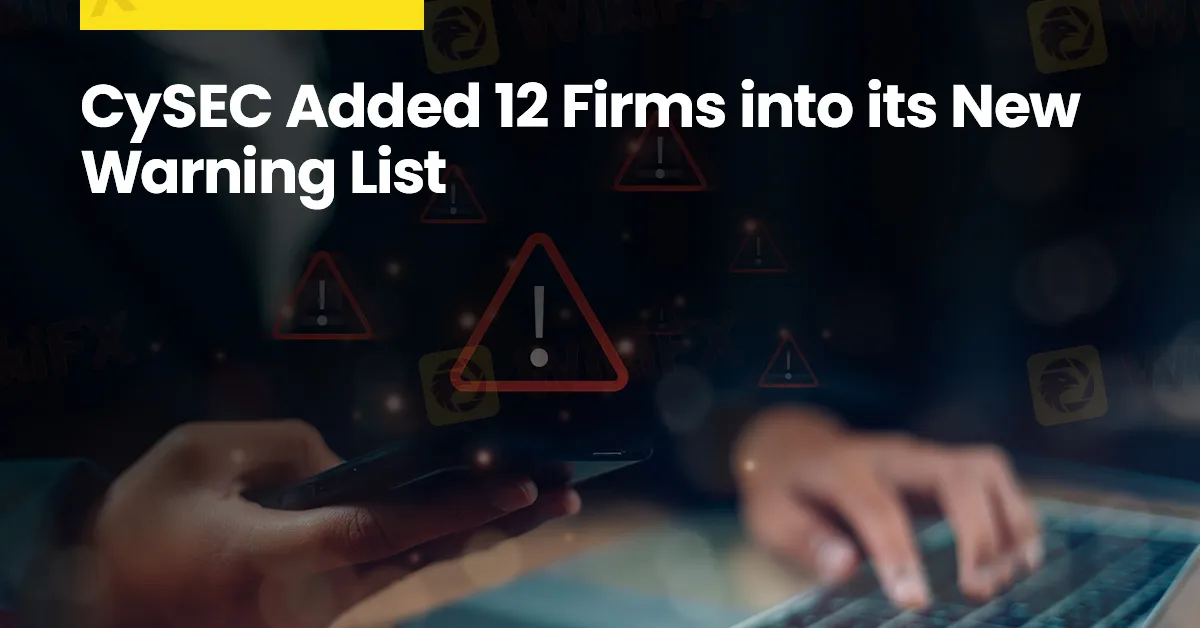简体中文
繁體中文
English
Pусский
日本語
ภาษาไทย
Tiếng Việt
Bahasa Indonesia
Español
हिन्दी
Filippiiniläinen
Français
Deutsch
Português
Türkçe
한국어
العربية
CySEC Added 12 Firms into its New Warning List
Abstract:CySEC has strongly cautioned investors about more 12 unlicensed websites advertising investment services.

The Cyprus Securities and Exchange Commission (CySEC) has expanded its roster of unauthorized investment firms by adding 12 new entities to its list on Tuesday.
The regulator cautions against accessing the following websites:
fundednowprop.com,
fiat-global.com & platform.fiatfxtrade.com,
buxmapps.com,
actaswiss.com,
trader-trust.eu,
fpmhelenic.com & client.clients-area.com/register,
wallstreet-fx.io,
fidelitycfd.com & wt.fidelitycfd.com,
vstarsoho.net,
alfacapitalmarket.com,
forexelite.co & forexelite.trade/private.
CySEC emphasizes that the aforementioned websites are not affiliated with entities authorized to provide investment services or conduct investment activities under Article 5 of Law 87 (I)/2017.

The Commission strongly advises investors to consult its official website (www.cysec.gov.cy) before engaging with investment firms to ensure they are licensed to provide investment services and activities.
CySEC urges investors to verify the licenses of investment firms through its official website before engaging in any transactions, emphasizing that only entities licensed under Article 5 of Law 87(I)/2017 are authorized to offer investment services in Cyprus.
Consistently, CySEC cautions consumers about the risks associated with unregulated websites falsely claiming to offer investment services, highlighting that engaging with unlicensed entities exposes investors to potential fraud without recourse under Cypriot regulations. CySEC encourages investors to report any suspicious investment activities and provides a comprehensive list of authorized investment firms in Cyprus on its website.
The reasons for avoiding investment services offered by unregulated entities are significant, as these firms operate without the protective measures of regulations meant to safeguard investors, leaving traders vulnerable to fraud or financial losses without avenues for compensation.
Furthermore, an analysis of unregulated offshore brokers reveals a heightened risk of scams, deposit losses, and predatory behavior towards traders and investors, attributed to the lack of accountability standards enforced by regulatory bodies.
Entities lacking CySEC regulation are not legally authorized to provide investment services under Article 5 of Law 87(I)/2017 in Cyprus, as CySEC consistently warns consumers about the fraudulent practices of unlicensed entities posing as trading and investment service providers, jeopardizing trader investments and funds by conducting business illicitly.

Disclaimer:
The views in this article only represent the author's personal views, and do not constitute investment advice on this platform. This platform does not guarantee the accuracy, completeness and timeliness of the information in the article, and will not be liable for any loss caused by the use of or reliance on the information in the article.
Read more

The Hidden Checklist: Five Unconventional Steps to Vet Your Broker
Forex broker scams continue to evolve, employing new tactics to appear credible and mislead unsuspecting traders. Identifying these fraudulent schemes requires vigilance and strategies beyond the usual advice. Here are five effective methods to help traders assess the legitimacy of a forex broker and avoid potential pitfalls.

Doo Financial Obtains Licenses in BVI and Cayman Islands
Doo Financial, a subsidiary of Singapore-based Doo Group, has expanded its regulatory footprint by securing new offshore licenses from the British Virgin Islands Financial Services Commission (BVI FSC) and the Cayman Islands Monetary Authority (CIMA).

CFI’s New Initiative Aims to Promote Transparency in Trading
A new programme has been launched by CFI to address the growing need for transparency and awareness in online trading. Named “Trading Transparency+: Empowering Awareness and Clarity in Trading,” the initiative seeks to combat misinformation and equip individuals with resources to evaluate whether trading aligns with their financial goals and circumstances.

Malaysian-Thai Fraud Syndicate Dismantled, Millions in Losses Reported
The Royal Malaysia Police (PDRM) has received 26 reports concerning the Nicshare and CommonApps investment schemes, both linked to a major fraudulent syndicate led by a Malaysian citizen. The syndicate’s activities came to light following the arrest of its leader by Thai authorities on 16 December.
WikiFX Broker
Latest News
ASIC Sues Binance Australia Derivatives for Misclassifying Retail Clients
WikiFX Review: Is FxPro Reliable?
Malaysian-Thai Fraud Syndicate Dismantled, Millions in Losses Reported
Trading frauds topped the list of scams in India- Report Reveals
AIMS Broker Review
The Hidden Checklist: Five Unconventional Steps to Vet Your Broker
YAMARKETS' Jingle Bells Christmas Offer!
WikiFX Review: Something You Need to Know About Markets4you
Revolut Leads UK Neobanks in the Digital Banking Revolution
Fusion Markets: Safe Choice or Scam to Avoid?
Currency Calculator


